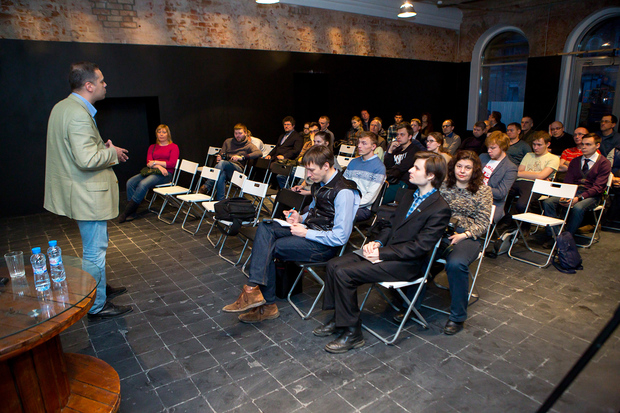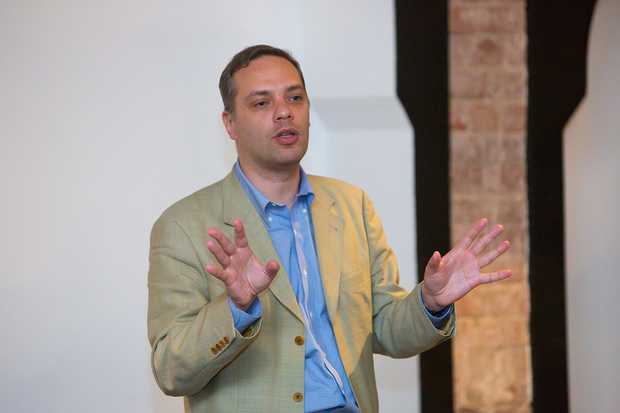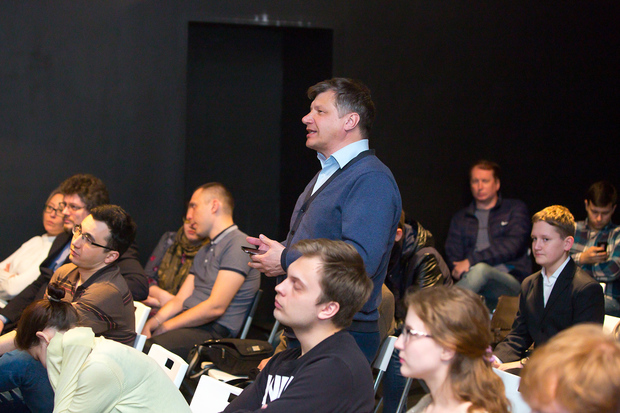Vladimir Milov: ‘In Tatarstan, the authority works much more responsibly’
The Moscow oppositionist supposes that oil price will be lower than $20 but not higher than $60 per barrel
Vladimir Milov, one of the representatives of the Russian opposition, a co-author of a sensational brochure PUTIN: What 10 Years of Putin Have Brought, arrived in Kazan on 4 April. In a public lecture, he told what the democratic coalition would do if it got into the State Duma, urged the supporters not to give up, gave his opinion about the events in Ukraine and also noted that he would not ask Open Russia for its support for the primaries of democratic forces because of the relationships with Mikhail Khodorkovsky. A correspondent of Realnoe Vremya was a witness of how the oppositionist did not find a reason to criticize the authority in Tatarstan.
'Many people say that, 'You will never have 5%'
About 50 people, including the leaders of the regional offices of Yabloko and People's Freedom Party, came to the meeting with the famous oppositionist. The meeting took place in the building of the former Museum of Soviet Arcade Machines. Despite journalists' expectations, firemen did not interrupt, the conversation was held in a relatively friendly atmosphere.
Vladimir Milov immediately offered not to organize a lecture but a build a communication in Question & Answer format. In his welcome speech, the politician characterized the situation in the country as an unprecedented crisis compared with the period of the Dissolution of the Soviet Union; it will be seen in the fact that the authority allowed a price rise in the electoral year, in particular, which gives the liberals all opportunities to enter the Parliament.
'Many people say that, 'You will never have 5%'. And I say: look at the figures. For instance, Navalny had 600,000 votes in Moscow, while the voter turnout was relatively low. It means that we can easily plan 1m votes in absolute terms in Moscow. In St. Petersburg, it would be 300,000, in Novosibirsk and Yekaterinburg – 200,000, and the Russians living abroad would make up 200-300,000. We will have to work hard, but it is an attainable goal,' Milov noted.

Milov said that inactivity is the main enemy on the way to the Parliament. In the politician's opinion, even a minimal representation at the Duma will allow to influence the processes that are taking place in the country, especially if United Russia doesn't have a majority. Milov estimated it as a real perspective.
'Model based on large state monopolies does not work'
As for the crisis, the speaker noted that it seems that the authority has no variants on how to deal with it because the economic problems are the result of a long-term economic policy, which started as early as 2013, a long time before the sanctions.
'We had a phenomenon of 2013, when oil cost $108 per barrel. Anyway, the industrial growth [Editor's Note: according to the results for the year] had a break-even performance, investments were at a loss, GDP growth made up 1%. At that moment many economists told that the model based on large state monopolies neither work nor generate development,' Milov told.
The politician offers a demonopolization, real development of the competitive environment and a professional discussion in the media as a solution. Milov also criticized the ideas of money creation. In his opinion, there is a crisis of demand and no competitive environment in the country, which would recycle the money supply. In addition, he told that the government made colossal investments. However, they don't yield fruits.

We had a phenomenon of 2013, when oil cost $108 per barrel. Anyway, the industrial growth had a break-even performance, investments were at loss, GDP growth made up 1%.
'Colleagues, don't throw nothing at me'
A question about the aspect of Tatarstan from the capital was one of the first. Many people surprised when the oppositionist noted that the republic has an obvious advantage over other regions.
'Colleagues, don't throw nothing at me, I don't praise your administration, but your state of affairs is objectively better compared with the others because your authority works much more responsibly. It is a plus. The minus is that the authoritarian system inevitably generates a stagnation,' the politician declared.
He additionally noted that in Tatarstan, it is more difficult to criticize the authority because it really has what to show the people.
Oil price, dangerous China and democracy for the Caucasus
Answering a question about a forecast for oil price, Milov said that the black gold won't cost $20 because it makes offshore projects unprofitable. However, a growth over $60 will inevitably lead to the increase of the 'substandard extraction', which will reduce the price.
As for China, the politician urged to be realistic towards our neighbour and noted that the main ties of this country are linked with the USA, first of all. And speaking of Russia, it has territorial claims on a part of Siberia.

The people who came to the meeting were interested in his position concerning the Caucasus. Milov told that centralization was the mistake of Moscow in this region, and a parliamentary democracy is the most appropriate model for the Caucasus.
Disappointment about Ukraine and Khodorkovsky
When he was asked about the relationships with Ukraine, Milov answered that in this situation, Russia should advance an initiative on de-escalation of the conflict. Otherwise, politicians, who shift the blame for all problems on the conflict with Russia, will keep receiving dividends. Moreover, the politician expressed his disappointment about the fact that this country has not managed to carry out reforms and restart the economy during two years.
'Reforms are not carried out there, unfortunately. Privatization, demonopolization, tax reduction – no progress in all directions during two years,' Milov told. But he noted that the Ukrainian should compose and finally do something with their economy.
Milov also quite unexpectedly denied a possibility of asking Open Russia for help in the primaries.
'I won't use the help of Khodorkovsky for sure,' the oppositionist noted. When he was asked for details, he added that, 'I know him from my previous work. I have personal issues. Might he work with his young, his supporters of United Russia,' Milov concluded, who, as it seemed, was speaking about a story about Ruzil Mingalimov.
As for the scandal of Panama Papers, Milov said that the clout of the authority suffered much. However, he asked his political like-minded people not to wait for a breakup in the elites because of these events.
Reference
Vladimir Milov (born on 18 June 1972, Kemerovo) is a Russian politician, the chairman of Democratic Choice Russian political party from May 2012 to December 2015.
- May-October 2012, Deputy Minister of Energy of Russia.
- Known as a publicist and author of regular articles in the leading business newspaper Vedomosti, Gazeta.Ru, Forbes Russia; author of many analytical materials, conceptual reports and publications on problems of the energy policy and development of infrastructure in Russia.
- During 2007, he published a series of articles, which gained a wide popularity, with a negative estimate of the results of Vladimir Putin's presidency in different spheres that were a foundation to the publication of a report called PUTIN: What 10 Years of Putin Have Brought.
- Since February 2010, he has been a leader of a public movement called Democratic Choice, which was registered as a public organization in 2010.
- May 2012, Milov was elected as the chairman of Democratic Choice. He is one of the authors of the political programme of Democratic Choice.
- 20 December 2015, Vladimir Milov left the post of the chairman of Democratic Choice.